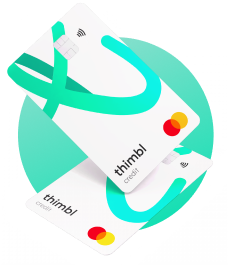Yes, you can check your eligibility for credit cards if you have bad credit, although be aware that your options may be limited and your chances of approval lower than somebody with a good score.
Before you apply, you must be confident that the credit card you choose is the right one for you and your circumstances.
You are welcome to check your eligibility for a thimbl credit card, even if you have poor credit.
Applying for a credit card with bad credit
Credit Cards for Bad Credit


 Check if you're eligible with no impact to your credit score
Check if you're eligible with no impact to your credit score Poor credit scores considered
Poor credit scores considered Complete our short application form and get a decision in just 10 seconds
Complete our short application form and get a decision in just 10 seconds48.9% APR Representative (variable)
 Check if you're eligible with no impact to your credit score
Check if you're eligible with no impact to your credit score Poor credit scores considered
Poor credit scores considered Complete our short application form and get a decision in just 10 seconds
Complete our short application form and get a decision in just 10 seconds

thimbl is a trading style of Digitonomy Limited which is a credit broker not a lender. Any credit that is obtained as a result of an application will be provided by Lendable Limited. Subject to eligibility. You may be offered a credit card with different terms if you do not qualify.


 For all credit scores
For all credit scores
 Check eligibility with no credit score impact
Check eligibility with no credit score impact


How’s your credit score looking? Perhaps you’d like to apply for a credit card for bad credit but are worried about your chance of approval? If your credit score is less than perfect, thimbl might be able to help.
Bad credit could make being accepted for a credit card a little more difficult, but there could be options. We’re proud to introduce our credit card for poor credit: the thimbl Credit Builder Credit Card with no annual fee.
When used sensibly alongside other credit-building methods, the thimbl Credit Builder Credit Card could help boost your credit rating.
We welcome all credit scores to check their eligibility for a thimbl Credit Builder Credit Card.
How does the thimbl Credit Builder Credit Card work?
- If your application is approved, use your thimbl Credit Builder Credit Card to make small purchases while staying well within your credit limit.
- Each month, make at least the minimum repayment due on your account. If you can, paying the balance in full every month could mean you won’t be charged interest during that period.
- Your activity will be reported to the credit reference agencies, demonstrating that you are able to manage your repayments which, in time, may contribute to an increase in your credit score.
It’s important to remember that the responsible use of a credit card by itself is unlikely to repair a bad credit score or raise your rating overnight. Regardless of your credit score, you should keep on top of any other financial commitments you have, such as credit cards or loans, and pay your bills on time to see a steady, gradual improvement. You might also want to explore other ways to boost your credit score, which we’ll talk about in more detail further down the page.
- For all credit levels, from poor to excellent
- Checking won’t affect your credit rating
- 48.9% APR Representative (variable)

What causes bad credit?
There are several reasons why your credit score may be looking a little worse for wear, including:

The information on your credit report is incorrect or outdated.

You are not on the electoral roll and there is no evidence linking you to your fixed UK address. This can be the case if you have never registered to vote in the UK.

You have fallen behind on or failed to make repayments on previous credit accounts.

You have multiple hard credit searches showing on your credit file over a short period of time.

You have declared yourself bankrupt or you have a county court judgement (CCJ) on your credit file.
A poor credit score is different from having no credit history at all; this is sometimes known as having a ‘thin’ credit file. You may have a thin credit file if you have never paid bills or used credit before, or if you have moved to the UK within the last 12 months.
Please note: in order to be eligible for a thimbl credit card, you must have lived in the UK for 12 months or more.
How to improve your credit score?
A good credit score could increase your chance of approval should you apply for credit. The good news is that you can take steps towards improving your credit rating today.
- Register to vote in the UK. This will link you to your current address and will make it easier for potential lenders to identify you.
- Take the time to check over your credit report for any errors or out-of-date details. If you spot any incorrect information, contact your credit reporting tool and ask for this to be corrected.
- Ensure that your bills and any existing credit commitments are paid on time each month.
- Limit the number of credit applications you make.
- Sharing a joint account with someone who has a very poor credit score could affect your own rating.
- When used carefully and responsibly, some credit cards, such as the thimbl Credit Builder Credit Card, could help rebuild your score. Of course, failing to keep up with the minimum repayments on your credit card could cause your credit score to fall.
How to check your credit score?
Before you apply for a credit card for bad credit, you might want to check your credit score on either TransUnion, Equifax, or Experian.
Both TransUnion and Equifax offer a free trial period, followed by a monthly charge, while Experian is a free-to-use service.
Can I apply for a credit card with bad credit?
Can I apply for a credit card for poor credit if I have no credit history?
You can apply for credit cards for bad credit, but it’s worth noting that a ‘thin’ credit file could restrict your options.
When you have little-to-no credit history, a lender is unable to judge how you manage your money.
Sensible use of credit products, such as a loan or credit card, could help to establish your credit rating.
How to apply for a credit card for bad credit with thimbl
We explain the process of applying for a thimbl Credit Builder Credit Card below.
- Complete our online form. This should take no longer than 60 seconds.
- Using soft search technology, we’ll check your eligibility with no impact to your credit score. Getting you a 'yes' or 'no' on your eligibility check takes around 10 seconds.
- If you have been pre-approved for a credit card, you will be redirected to our trusted provider - Zable - to run through some additional checks, including a hard credit search. Please remember that pre-approval does not guarantee you will be accepted for a card.
- Once with Zable, you’ll complete a full application, which includes a hard credit search. Hard searches will be visible on your credit file for up to 12 months, and too many hard searches in a short space of time could lower your credit score.
- If Zable are happy with the results of their checks and decide to approve your application, they will send you a credit agreement. You should read this thoroughly before deciding if this is the right credit card for you. A credit card is a serious financial commitment.

Page last reviewed: 18th February 2025
Page reviewed by: Harry Lawrance
You get all this with thimbl
Tap and go
Quick and easy contactless payments up to £100.
Secure banking app
Manage your credit card online, wherever and whenever you like, with the free mobile app.
A trusted service
Over 4,500 positive reviews from our customers.
48.9% APR Representative (variable)
Quick links








Worried about money?
If you're worried about the cost of living, need support with budgeting, or think you might need debt advice, StepChange could help. They offer free and impartial support and help hundreds of thousands of people every year to deal with their debts and take control of their finances.
To find out how StepChange could help you, take the free Money Health Check. It's quick and easy to complete, and will give you a personalised recommendation on what to do next.
Meet the team
Head of Compliance
Head of Partnerships
Managing Director, thimbl
Marketing Manager, thimbl
Financial Content Writer
Frequently asked
questions
If you've got a question, you may just find the answer you're looking for here. If not, please visit our contact us page and get in touch.
What will my credit limit be?
You will always be made aware of any credit limit changes to any credit cards you have beforehand, and you do not have to accept a credit limit increase if you don’t feel it’s right for you.
What happens if I fail to make my repayments?
Missed payments will be reported to the credit bureaus, and your account will appear as in arrears. You will be charged a late fee, which is usually around £12. Your credit rating is also likely to decline as a result.
You should try to make your missed payments as soon as possible.
If you’re struggling to keep on top of your repayments, you can find free, impartial advice from MoneyHelper, StepChange, Citizens Advice and National Debtline
If you want to know more about how credit cards work, you can read our blog.
Did you find this article helpful?
Let us know how we can be more helpful
Please leave your anonymous feedback to help us keep improving.
Need help or support?
Whether it’s a question or you just need support, we’re here to help.






